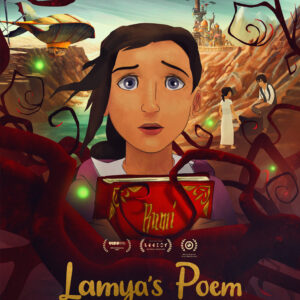Set in 2016 at the height of the Syrian civil war, a young girl named Lamya and her mother live in Aleppo, trying to keep their community together while the conflict looms ever larger. Mourning the loss of her father at the hands of the regime, Lamya’s mother is too afraid to let her leave the house. Lamya’s teacher, Mr. Hamadini, stops by to give her a book from his personal library: a collection of poems written by renowned 13th-century poet and scholar Rumi. The war soon comes to their doorstep, forcing Lamya and her mother to leave their home and sell everything to afford ferry tickets that will take them across the Mediterranean; a dangerous and uncertain journey brings them to the gates of an unwelcoming European refugee camp.
Lamya finds solace and escapism in the verses and stanzas of Rumi’s poetry. The power of its words transports her into a world filled with fantasy, floating rocks, and opulent airships hovering above a beautiful city. In this world, she finds Rumi in his early years and knows him as Jalal; soon after they meet, they witness an army of monsters marching on this dream-scape city, representing the dangers that they both faced as refugees fleeing their homeland. This nightmare is the manifestation of the trauma that children experience, trying to comprehend the violence and emotional scars of running away from all they have known.
In parallel to Lamya’s story, we see the young Jalal become displaced after escaping the Mongol hordes that invaded his homeland. After being forced to leave, he struggles to find his purpose in life and the will to write poetry, tormented by nightmares of the creatures chasing him and the hopelessness that clouds his mind with thoughts of revenge. His father urges him to focus on his artistic gifts so that, one day, his poetry can help others use good to fight evil, instead of breeding hatred.
Through space and time, Jalal and Lamya are able to meet each other in their dreams as they find their ways to overcome the dire circumstances, with Lamya trying to help Jalal become the great poet whose work will eventually save her and inspire readers around the world for generations. The story is geared toward a younger audience, using vivid imagery and the timeless lessons of Rumi’s (Jalal) poetry to inspire the film’s message: recognizing the feeling of separation and the longing for hope, but not letting the pain of your past turn you into the monster that caused it. The voice of Rumi and star of Disney’s “Aladdin” Mena Massoud expressed in an interview that the film talks about how “sometimes the people that hurt us the most are the people that need us the most.”
The animated film was nominated for Best Feature at the Annecy International Animated Film Festival in 2021 and for Best Children’s Film at the Zurich Film Festival. It can be streamed on Amazon Prime and Tubi.
Discussion Questions:
- In what ways can literature and poetry help people, especially children, process trauma and overcome adversity?
- How does Rumi’s poetry on love and forgiveness transform both the victim and the perpetrator in the face of profound evil, and is true healing possible without it?
- What is the film’s commentary on the refugee crisis? How does it showcase the struggles migrants experience fleeing their homes and the discrimination they face?


